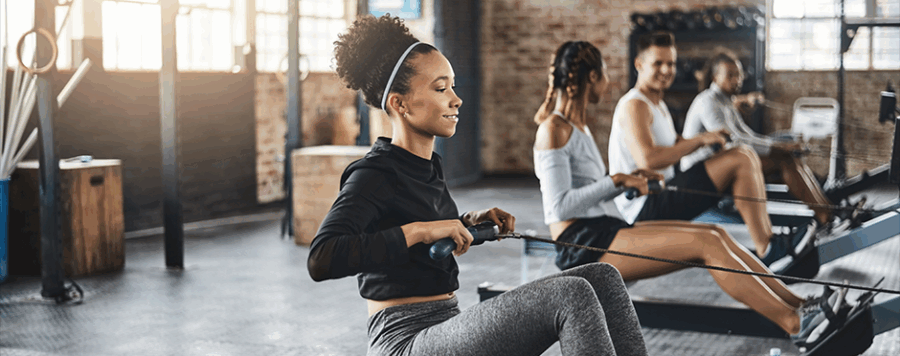Morning Workouts
Pros:
- It can help to boost your mood for the rest of the day. Exercising can increase dopamine, and you may experience less stress throughout the day.
- It supports better sleep quality. Early morning aerobic exercise can increase deep sleep and reduce the number of times you wake up throughout the night.
- It can help you make better choices throughout the day. If you work out in the morning, you will likely make smarter daily food choices to keep your healthy “momentum” going.
Cons:
- Some people may need additional time to warm up because their body temperature is lower in the mornings.
- Morning times at the gym tend to be crowded, as that’s typically busy time for most gyms. This could make it harder to get to classes or use that piece of gym equipment you were eyeing.
- Some people are not natural morning people and will have trouble “waking up” for an effective workout.
Evening Workouts
Pros:
- Higher body temperature in the afternoons can make getting ready to work out more comfortable.
- If timed right and with the right intensity, working out in the afternoon can help you get better, higher-quality sleep.
- Afternoon workouts are a great way to relieve the stress from the day. Personally, this is one of the main reasons for my evening workouts. It’s a nice way for me to decompress from the day’s stressors.
Cons:
- Working out too intensely, and too close to bedtime can disrupt sleep patterns. It is important to strike the correct balance of intensity and time before bed for the appropriate response.
- For those with family commitments, evening workouts can be challenging to stay consistent with, as most extra-curricular activities are in the afternoon or evening.
- Early evenings are typically a very busy time in most commercial gyms, and this could make things difficult if classes being filled up or equipment is unavailable.
Now that we have the pros and cons listed for morning and evening workouts, what does the science say is best? As you can see, there are advantages and disadvantages to both. But the bottom line is that you should choose to work out at a time of day that will allow you to be the most consistent and effective for your goals.
If pain is holding you back during your workouts or preventing you from staying active, reach out to our team to schedule a free assessment so you can get back on your feet sooner and achieve your health and wellness goals!
*Per federal guidelines, beneficiaries of plans such as Medicare, Medicaid, Tricare, VHA and other federally funded plans are not eligible for free assessments.
The Athletico blog is an educational resource written by Athletico employees. Athletico bloggers are licensed professionals who abide by the code of ethics outlined by their respective professional associations. The content published in blog posts represents the opinion of the individual author based on their expertise and experience. The content provided in this blog is for informational purposes only, does not constitute medical advice and should not be relied on for making personal health decisions.
References:
1. https://journals.physiology.org/doi/full/10.1152/physiol.00030.2020
2. https://link.springer.com/article/10.1007/s40279-018-1015-0
3. https://www.nature.com/articles/s41366-019-0409-x
4. https://www.dovepress.com/effects-of-exercise-timing-on-sleep-architecture-and-nocturnal-blood-p-peer-reviewed-fulltext-article-VHRM
Tanner Neuberger is a Doctor of Physical Therapy and Certified Manual Therapist who specializes in Orthopedics, Sports Rehabilitation, Dry Needling, and Blood Flow Restriction. Tanner graduated from St. Ambrose University in 2016 and was a collegiate athlete in undergrad at the University of Texas of the Permian Basin. Tanner uses his extensive knowledge of manual therapies and strength and conditioning to get his patients back on track and performing better than ever.

 width="900"
height="356"
>
width="900"
height="356"
>
